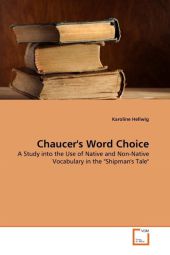 Neuerscheinungen 2010Stand: 2020-01-07 |
Schnellsuche
ISBN/Stichwort/Autor
|
Herderstraße 10
10625 Berlin
Tel.: 030 315 714 16
Fax 030 315 714 14
info@buchspektrum.de |

Karoline Hellwig
Chaucerīs Word Choice
A Study into the Use of Native and Non-Native Vocabulary in the "Shipmanīs Tale"
2010. 68 S.
Verlag/Jahr: VDM VERLAG DR. MÜLLER 2010
ISBN: 3-639-29503-X (363929503X)
Neue ISBN: 978-3-639-29503-0 (9783639295030)
Preis und Lieferzeit: Bitte klicken
English is the most widely spread language being used around the world and shows as well as other human tongues evidence of having borrowed or adopted words obviously not being of native origin. An eventful history around the British Isles leaves enormous marks on its language, and so do the people who lived there. Amongst these was Geoffrey Chaucer the great poet of the well known Canterbury Tales. He is often entitled as the inventor of foreign words. Some scholars investigating in his works argue that he introduced non-native items due to a lack in the English vocabulary inventory, others assume that he simply used the language of the educated people of his day. Or have foreign words simply been introduced due to the arising of new inventions for which no word existed yet? The author Karoline Hellwig sheds some light on the matters of the etymology of Geoffrey Chaucerīs words, which he used in the Shipmanīs Tale and wants to demonstrate if the vocabulary of these Middle English period survived the alternations of time. Are the scholarsī accusations of Chaucer having corrupted the English language justified or does this investigation reveal the contrary?
Karoline Hellwig, B.A.Linguistic at the University of Constance, Germany.


